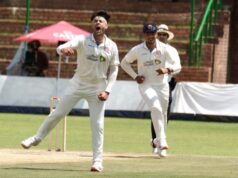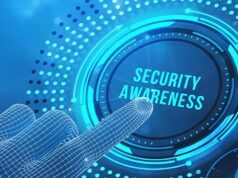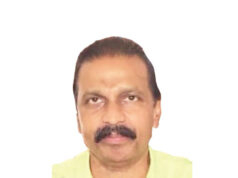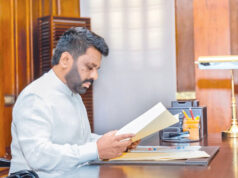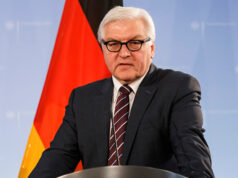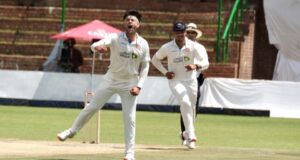The 32nd Dr. C. W. W. Kannangara Memorial Lecture titled ‘For a country with a future’: Educational reforms Sri Lanka demands today’ delivered by Prof. Athula Sumathipala, Director, Institute for Research and Development, Sri Lanka and Chairman, National Institute of Fundemental Studies, Hanthana on Oct 13 at the National Institute of Education,
Maharagama
Continued From Monday (24)
A pilot project is due to start this year in 215 schools. Training the principals and teachers at these schools is also carried out via self-learning methodologies. The contribution from the Distance Learning Centre towards this work is extensive and will extend further in future. This communication currently runs on e-Thaksalawa, You Tube and Nanasa, eight educational channels on Dialog TV.”
We believe education is a right rather than a privilege, and believe the impact of Covid-19 on the education of under-privileged students and students at risk was greater than on others. Social disparities have steepened both due to Covid-19 and the fuel crisis. Under-privileged children such as those from rural areas, students with disabilities, should be prioritised within the social movement of enhancing access to education. At a time of widening socio-economic disparities, it is important to pay attention to equality, and, extending this further, to equity. It is however necessary to warn that the reality is very different to this ideal, and that a situation is now being created where privileged socio-economic layers of society are at a much greater advantage, similar to the pre-Kannangara era, in the context of the current economic, social and political crisis.
(v) Relationship between education and health
The inseparable connection between education and health is more evident than ever before following the Covid-19 pandemic. I emphasise that I refer to both physical and mental health when I refer to health. I do not intend to discuss this extensively in this lecture but wish to point out the crucial need for the health sector and the education sector to co-ordinate and work together, much more than it is being done today.
I would also like to emphasise that this is a concept closely aligned with the Kannangara vision.
(vi) Continuous professional development of education professionals
Much of the negative influence on the dignity and quality of any profession arises from the actions of a small minority. The serious concern here is the tendency of that minority to override the majority opinion and get them to adopt the minority view. The harm that is caused by suppressing the views of the majority who are usually peace-loving and dislike conflict is significant. It is therefore necessary to empower the majority to subdue the harmful minority. This can be done in two ways: professional empowerment and empowering the individual personality.
The Sri Lankan Education Service was unable to entirely avoid the decline in socio-cultural sensibilities, the move towards materialistic individualism, and the weakening of moral fibre, that was seen in general society after 1977. My personal experience, however, is that the majority of the teaching community are still people who think beyond personal gain and consider their profession to be a public service.
It is this teaching community that help develop all types of professionals and intellectuals for society. The pride teachers have in their profession as well as the respect society accords to teachers should therefore be at least as high as, if not higher than, the respect accorded to professionals such as doctors, engineers, professors and university lecturers. It is therefore critically necessary to instigate well-structured and wide-reaching programs for the continuous professional development of teachers, alongside educational reforms.
H.M.R. Kokila Nandani Priyanthi, manager of the Teachers Professional Development Centre in Ampara, wrote an article for the Gaveshana magazine previously mentioned to explain in detail the professional development of teachers in Sri Lanka. She states as follows:
“The continuous professional development of teachers is the responsibility of individual teachers just as much as it is the responsibility of the Department of Education. At the moment, teachers’ trade unions mediate on the rights of teachers; however, the role of professional organisations is different. For example, the GMOA, the Government Medical Officers’ Association is the trade union of doctors. The SLMA, the Sri Lanka Medical Association is the professional organisation of doctors. The SLMA carries out an extensive range of activities throughout the year to enhance the professional knowledge and practice of doctors. This type of activity is essential for the teaching profession as well, in order to update their knowledge and skills”.
Education
It is difficult to provide a clear definition for an abstract term such as education. The concepts of teaching, learning, assessment, appreciation (of music, literature etc), practical skill development and many other concepts are all encompassed within education. The word education was derived from Latin, from the word ‘e-ducere’ which means ‘to lead out’. Every person has the potential energy to carry out certain tasks and the role of education is to divulge this hidden energy. It is said that only 5%-10% of this energy is developed in people, therefore, evidently, education needs to expand further.’
Krishnamurti states that education is not the learning of subject matter from books or memorising facts. Education is the critical analysis of facts given in books to determine if such facts are accurate. Identifying the needs of students and creating a pathway for them to realise their expectations by giving them suitable practical experience is also education. The role of education is to bring about a balanced outcome in a person’s development, incorporating physical, mental, social, cultural, ethical and spiritual development.
It has been emphasised that the primary aim of education is not only the quantitative aspect of training a student to successfully get through examinations, but also to enhance the positive personal qualities of a student. The mark of a high-quality education is therefore that it can support a person and society to meet national objectives, both individual and societal.
Quality improvement in education
The key question when considering the quality of education is – what does quality mean? Quality in a business sense is the ability to meet requirements and suitable for usage.
It is necessary to ascertain how ready education professionals in Sri Lanka are to meet the requirements of the 21st century. In order to do so, first, it is necessary to determine what skills an educator should have, and who falls into the category of education professionals. University professors, lecturers, members of teaching faculties of educational institutions would all be considered educators, however, from the viewpoint of general society, school principals and teachers are usually considered education professionals, and it is they who contribute the most to the Sri Lankan education system.
Teachers’ professional skills
A skill is the ability to carry out a particular task. Skills incorporate something beyond mere knowledge. The teachers’ guides of the National Education Institute state that “a skill is defined as a combination of knowledge, abilities and attitudes. Skills can contain one or more of these three components in varying ratios. Some skills may incorporate a greater percentage of ability, whereas others may contain a higher proportion of knowledge or attitudes.” Research indicates that skills have been defined in many ways.
The Commonwealth Report of 1974 explains the skill set a teacher needs as follows: “To be a skilled teacher, a person needs knowledge about childhood development, material and strategies for teaching and he should be a person who uses these skills to instruct students/community.”
The 21st century began with unusually rapid development in technology and in communication. A new technology can become obsolete even as it is introduced to the market. In such a rapidly changing world, the skills necessary for learning and employment include creativity, innovation, critical thinking and problem solving, communication, teamwork, information management, effective use of technology, professional and technical life skills, and cultural flexibility.
Sri Lankan teachers enjoy a positive reputation although there are questions about their professional skills. To improve the quality of education, it is necessary that the teacher becomes skilled in his profession, and this is a critical and urgent need today.
Professional development
It is teacher education that gives people with different belief systems, ethics, values and personalities who enter the profession, the knowledge, skills, beliefs and the persona to form the foundation for a high-quality teacher.
Globally, teacher education is therefore provided in two formats: pre-employment teacher education at the time of entering the teaching service, and, continuous education, professional development while being employed. It is necessary to assess if such education is adequately provided to Sri Lankan teachers.
Continuous professional education is important since research has indicated that pre-employment training alone is insufficient to develop an effective teacher since a teacher does not receive a fully adequate practical experience during the pre-employment period. A teacher should learn how to teach by experiencing actual teaching. It is also important to provide continuous professional education as it increases the quality of the teacher’s work and enhances job satisfaction. The quality of an education system depends on the quality of the teachers employed within that system, leading to a special emphasis on professional teacher education globally.
In 2009, the National Institute of Education defined teacher education as the mechanism for teachers to achieve professional skills. Professional development is achieved as the teacher learns the practical skills necessary to pass on the knowledge he possesses to the students. Professional development can therefore be defined as become aware of and further improving the experience, skills and usage to carry out the task of teaching more effectively. In 21st century professional development, the teacher has to prepare himself for an uncertain, highly complicated future.
Teacher education and certification started in Sri Lanka in 1970 with the establishment of general schools. The Universities of Colombo and Peradeniya, the Eastern University, the University of Jaffna, the Open University and the National Institute of Education offer Post-graduate Diploma in Education and Master of Education programmes, which are in line with modern global trends of teacher education, primarily for teachers with a Bachelor’s degree. The primary content in these programmes is to provide pedagogical education to teachers (National Education Commission Report, 2014). This report also states that further education programmes for teachers without a basic degree also give primary focus to pedagogy.

